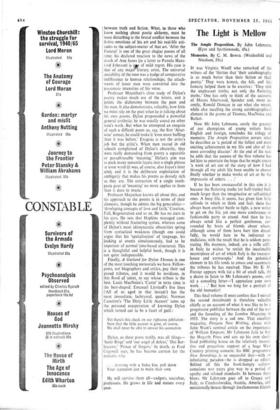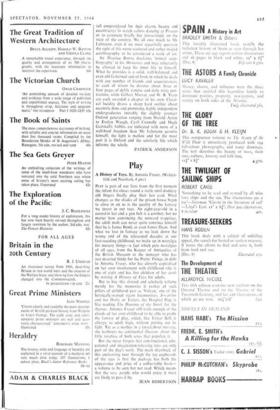The Light is Mellow
Memories. By C. M. Bowra. (Weidenfeld and Nicolson, 55s.) IT was Virginia Woolf who remarked of the writers of the 'thirties that 'their autobiography is so much better than their fiction or their poetry.' They were honest, she felt, and this honesty helped them to be creative: 'They told the unpleasant truths, not only the flattering truths.' One has only to think of the accounts of Messrs Isherwood, Spender and, more re- cently, Ronald Duncan to see what she meant, while also recalling the strong autobiographical element in the poems of Thomas, MacNeice and Barker.
Now Mr John -Lehmann, surely the greatest of our champions of young writers both English and foreign, concludes his trilogy of memoirs. The Ample Proposition covers what he describes as 'a period of the fullest and most exciting achievement in my life and also of the most corroding disaster.' At the end of his task he adds that the success of the first volume has led him to entertain the hope that he might create `a work of art out of the story of how I had through all my adult life been unable to choose finally whether to make works of art or be the impresario of others. . .
If he has been unsuccessful in this aim it is because the flattering truths (or half-truths) bulk much larger than the imaginative or self-critical ones. A busy life, it seems, has given him little solitude in which to think and feel; there has always been another battle to fight, a new writer to get on the list, yet one more conference or fashionable party to attend.. And then he has always acted like a perfect gentleman, sur- rounded by hosts of friends about whom, although some of them have hurt him dread- fully, he would hate to be indiscreet or malicious, with the result that he is seldom pene- trating. His manners, indeed, are a trifle stiff: in Italy he wishes `to revisit the inestimable masterpiece of art of which Italy is the treasure- house and cornucopia.' And the polemical element in his life tends to amass and accentuate the tributes he has received. Thus Mr E. M. Forster appears with (a) a bit of small talk, (b) a desire to listen to Mr Lehmann's poems, and (c) a consoling letter-1 appreciate your own work. . . .' But how we long for a portrait of the old humanist!
This final volume (I must confess that I missed the second instalment) is therefore valuable chiefly as an account of what it was like to be a progressive publisher between the end of the war and the founding of the London Magazine in 1953. The story is a sad one. That excellent magazine, Penguin New Writing, closes with John Wain's seminal article on the importance of William Empson; Mr Lehmann fails to buy the Hogarth Press and sets up his own short- lived publishing house on the relatively insensi- tive and precarious support of a huge West Country printing concern; his BBC programme New Soundings is so successful that—with an infuriating paradox—he is dropped as editor. Behind all this the book-hungry culture- conscious war years give way to a period of apathy and relaxed standards. In between these blows Mr Lehmann goes off to Greece and Italy, to Czechoslovakia, Austria, America, and occasionally thrusts through the clamorous friends
(all congratulated for their charm, beauty and eccentricity) to watch sailors dancing at Piraeus or to comment briefly but interestingly on the state of the country. We all owe much to Mr Lehmann, even if we must regretfully question the right of this name-scattered and rather insipid autobiography to be considered a work of art.
Sir Maurice Bowra disclaims 'formal auto- biography' in his Memories and may reluctantly be allowed to keep his inner life to himself. What he provides is a solid, well-balanced and even old-fashioned sort of book in which he deals with any number of friends and acquaintances, to each of whom he devotes about three or four pages of deftly concise and drily witty por- traiture, while Gilbert Murray and W. B. Yeats are each awarded a chapter of his own. Classi- cal lucidity draws a sharp hard outline about eccentric dons and promising, highly independent undergraduates (notably the slightly younger Oxford generation ranging from Harold Acton to Evelyn Waugh, Cyril Connolly and Hugh Gaitskell); foibles are indicated with more of a well-bred freedom than Mr Lehmann permits himself; the light is mellow and for the most part it is Oxford and the scholarly life which informs the whole.
PATRICK ANDERSON















































 Previous page
Previous page